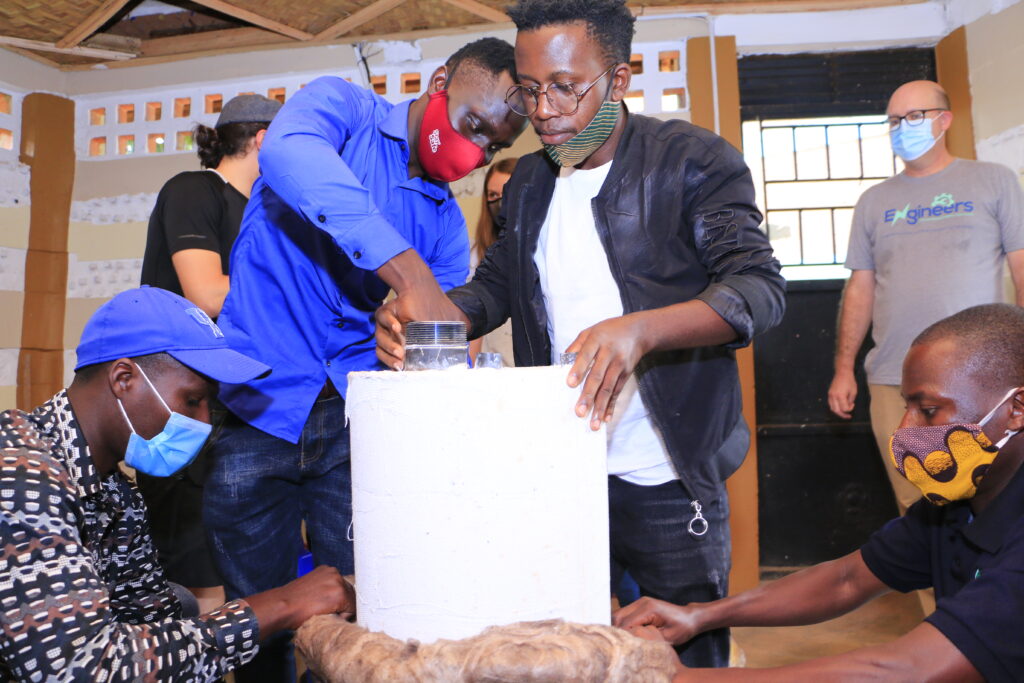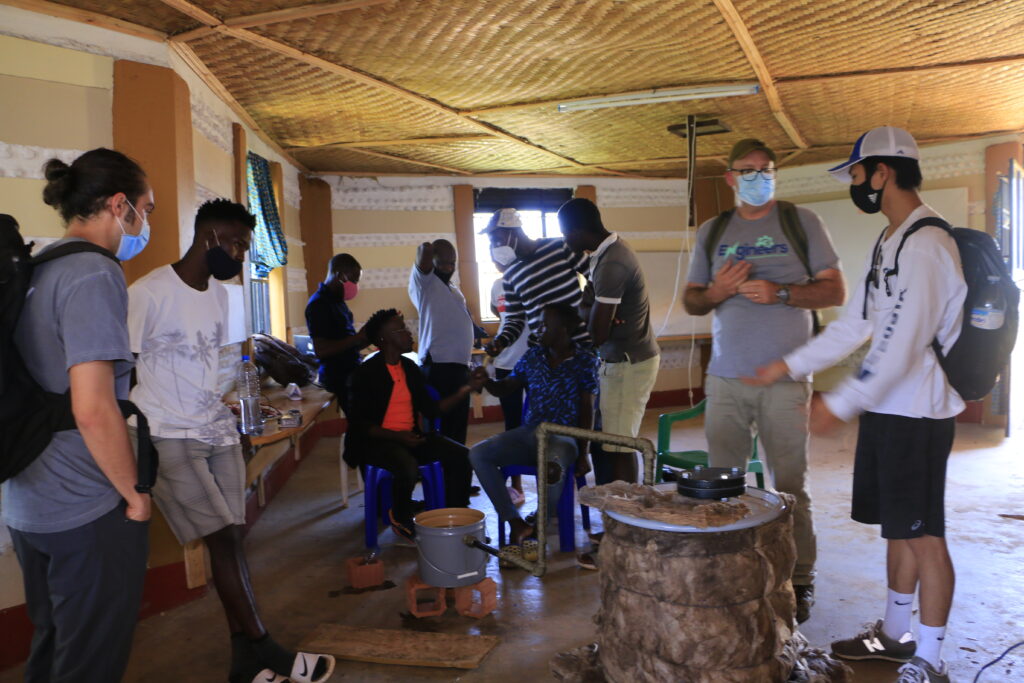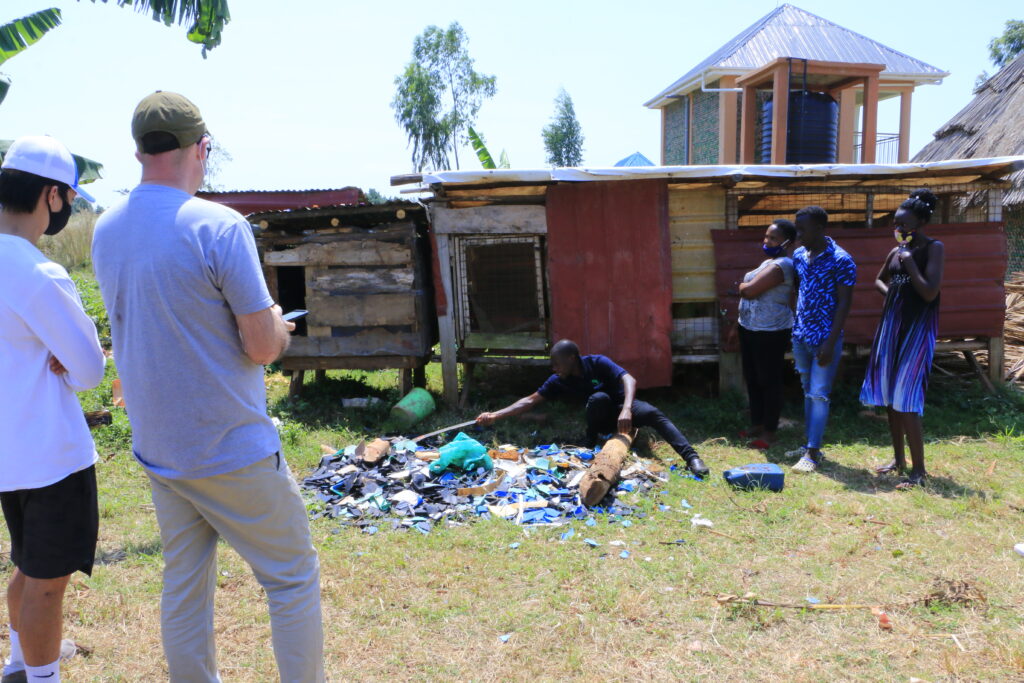When asked about the fruits of his work in plastic recycling, Uganda’s environment advocate John Mary Kavuma quickly refers to a housing project in Mpigi, about 40 kilometers out of the capital Kampala.
For about seven years, he has been turning plastic waste into construction materials. These particular houses were built with the same, and a blend of fashionable fabric.
However, through his Upcycle Africa, a climate change and waste management organization, Kavuma is moving beyond making the construction to converting the nuisance waste into energy.

A house built out of plastic waste material by Upcycle Africa. Courtesy photo.
“The plastic waste brought at the site is for building houses, however much of it cannot be recycled, so we turn it into different types of fuel,” he says of the new initiative which seeks to incinerate the construction debris into gasoline, diesel, kerosene, and domestic gas.
“We needed an alternative to the waste we were also creating. In addition to that many of it remains unused when brought here,” Kavuuma explains.
Kavuma received Poly Fuel processors through a partnership with Empowered Solutions for Environmental Sustainability (ESES), a recycling non-profit initiative.
The plastic waste problem in Uganda has been exacerbated by the increasing consumption of soft drinks and water packaged in plastic bottles. Big beverage companies and many other bottling companies have been transitioning from glass bottles to plastic, leading to a surge in plastic pollution.
Currently, the country imports 8.6 million pieces of pre-form PET bottles per day. Globally, 438 million tons of new plastic are produced every year with only a meager ten percent (10%) being recycled, according to the United Nations Development Programme.
Immediate solutions are necessary that are affordable, user-friendly, safe, and durable. One viable solution is converting plastic waste into fuel oil, which can be utilized in diesel engines, kerosene lamps, and cookstoves.
“We need a multifaceted approach that establishes efficient waste collection systems that prioritize proper separation and disposal of plastic waste,” Uganda Plastic Manufacturers and Recyclers Association (UPMRA) spokesman Moses Ategeka advised.

John Kavuma takes a colleague through a plastic recycling process. Courtesy Photo.
John Kavuma in partnership with a research team at the University of Kentucky and Engineers for Sustainable Energy Solutions (ESES), has incorporated the Trash-to-Tank processor in his plastic recycling.
The machine is now poised to convert about a tones of soft plastic material into fuel in a day.
“This conversion process breaks down the plastic completely, permanently removing it from the environment,” Kavuuma explains
“We put plastic waste into the Polyfuel processor and that’s where the pyrolysis process takes place and fuel is produced. So, depending on the heat, you can get different products of fuel, “he adds.
While the chemistry behind this process has been well established, developing a simple and low-cost process suitable for the developing world poses a challenge.
Do we need alternative solutions
Reports from the National Environmental Management Authority (NEMA) of the 600 tonnes produced every day throughout the country. Only 40% of this waste is collected and disposed of properly, the remaining 60% finds its way into the environment leading to a number of problems.
“A total of 51% of the plastic garbage in the city is not collected and ends up in drainage channels, wetlands, natural watercourses, manholes, undeveloped plots, and on the roadside.” Dr. Barirega Akankwasah the Executive Director of NEMA noted.
Improper disposal practices worsen the situation, with plastic garbage being visible everywhere, blocking drainage systems during the rainy season, and creating mountains of waste in dumpsites.

A Poly Fuel processor machine being unveiled by a team from Empowered Solutions for Environmental Sustainability (ESES) and Upcycle Africa. Courtesy photo.
The uncollected plastic waste in Uganda amounts to approximately 9.948 tons annually, as reported by a study conducted under the GKMA PET Plastic Recycling Partnership.
The Ministry of Water and Environment acknowledges the disastrous impact of plastic waste in both urban and rural areas.
In an effort to address the plastic waste challenge, the (UPMRA) advocates for the enforcement of the National Environment Act 2019.
“This act aims to conserve the environment through effective plastic waste management and impose penalties, such as a 10 million shillings fine, on corporate companies that contribute to plastic waste pollution,” UPMRA spokesman Moses Ategeka
He adds that the full implementation of the act has been lacking, and no prosecutions have taken place under its provisions thus far.
Could Turning Plastic into Biofuel Be the Answer?
Recycling plastic waste is often seen as a solution, but the reality is more complex due to various factors. While plastic is technically recyclable, it needs to be sorted, transported to recycling facilities, and undergo a complex recycling process
These challenges are more pronounced in developing countries like Uganda, where limited infrastructure makes collection, sorting, and recycling nearly impossible.
Improperly managed garbage dumps like the Kiteezi landfill offer little improvement over directly dumping plastic waste into ditches, as lightweight plastic items can easily be swept away by wind and rain, ending up in waterways.
Kavuuma’s processor uses high temperatures between 250 and 900 degrees Celcius to heat plastics in the absence of oxygen to produce liquid. The process, called pyrolysis, generates liquid fuel such as gasoline, diesel, kerosene, and domestic gas.

A worker from Upcycle Africa filters through plastic debris from a house project. Courtesy Photo.
Since he is a renowned plastic recycler, the community collects plastic waste from all over and brings them to the organization.
“We are well known here in the community, so people bring plastic to us at a small fee.” Kavuuma says.
The project is currently being trialed in Mpigi district and unlike other people that have previously done this same project, Kavuuma strictly uses electricity, and the reactor is fashioned in a way that prevents any carbon dioxide from escaping during the pyrolysis
The two-hour process is quite simple, the processor has to be tightly sealed. For those that use reactor drums aluminum foil paper is used to help shut off any hole that will allow in oxygen, which in turn will react with hydrogen to produce water. However, the Polyfuel processor is mechanized and only needs to be bolted with a thermometer that helps to measure the heat during the process.
Turning plastic to fuel dates back to many years ago in Uganda. For the last five years research has been made on using firewood based reactors to convert the plastic to fuel. Kavuuma, has recently joined the initiative with his reactor depending solely on electricity.
“Many use firewood, but that contributes to carbon footprint, so we use electricity and leave the plastic to boil to up to 300°C, during which the plastic will be broken into compounds of carbon and hydrogen, hence producing a vapor that is cooled down into fuel.” Lukyamuzi Didas, an employee with Upcycle explains.
He further adds that the temperature is automated at the beginning of the process to determine the fuel needed.
“If you want kerosene, the temperature must be moderate and higher if you are going for diesel which is heavier than petroleum and kerosene”, He adds.
Albeit being a very resourceful venture, plastic fuel still has a long way to go. The production of fuel still remains on the low and still cannot match with the production of fuel by oil companies. The users still struggle to access outside the area of production making refills hard to reach.
“My challenge is, it’s not accessible, I have to buy it at the site, there are no vendors to sell it to us like how you see Shell.” Nakalyowa Justin, a kerosene user.
The development of such innovative and accessible solutions, like the Trash-to-Fuel processor, holds promise in addressing the immediate challenges of plastic waste accumulation. By converting plastic waste into fuel oil, this solution offers a way to permanently remove plastic from the environment while providing an alternative energy source.
However, broader efforts are still required to reduce plastic consumption, improve waste management infrastructure, and promote sustainable alternatives to tackle the plastic waste problem effectively.
Recent News
Communities Act Against Hunger and Malnutrition in Uganda and South Sudan
The Mukono Way of Beating Bad Roads
© 2022 - Media Challenge Initiative | All Rights Reserved .


